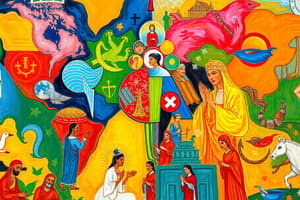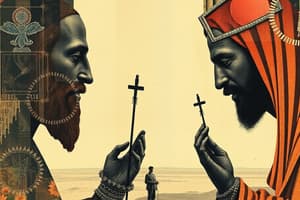Podcast
Questions and Answers
What is the definition of religion?
What is the definition of religion?
A system of beliefs, practices, and values, often involving a belief in the sacred or divine.
Which of the following are purposes of religion? (Select all that apply)
Which of the following are purposes of religion? (Select all that apply)
- Creates community and belonging among followers (correct)
- Offers a moral framework for behavior (correct)
- Creates conflict among individuals
- Provides meaning and purpose in life (correct)
What are the major components of religion?
What are the major components of religion?
Beliefs, rituals, and ethical guidelines.
Name one major world religion.
Name one major world religion.
Which of these religions is based on the teachings of Jesus Christ?
Which of these religions is based on the teachings of Jesus Christ?
_____ emphasizes the path to enlightenment through the Four Noble Truths.
_____ emphasizes the path to enlightenment through the Four Noble Truths.
What role does religion play in society?
What role does religion play in society?
Religion has no influence on laws and social policy.
Religion has no influence on laws and social policy.
What is a challenge faced by religion in the modern world? (Select all that apply)
What is a challenge faced by religion in the modern world? (Select all that apply)
What is one common element shared among major world religions?
What is one common element shared among major world religions?
Study Notes
Chapter 1: Introduction to Religion
- Definition:
- Religion as a system of beliefs, practices, and values.
- Often involves a belief in the sacred or divine.
- Purpose of Religion:
- Provides meaning and purpose in life.
- Offers a moral framework for behavior.
- Creates community and belonging among followers.
- Major Components:
- Beliefs: Core tenets of a faith.
- Rituals: Established practices associated with a faith.
- Ethical Guidelines: Moral codes governing behavior.
Chapter 2: Comparative Religion
- Overview of Major World Religions:
- Christianity: Based on the teachings of Jesus Christ.
- Islam: Followers of Muhammad and the Quran.
- Hinduism: Diverse beliefs and practices; focuses on karma and dharma.
- Buddhism: Emphasis on the path to enlightenment through the Four Noble Truths.
- Judaism: Foundation of monotheistic faiths; covenant with God.
- Common Elements:
- Creation Myths: Different narratives about the origins of the universe.
- Deity Concepts: Various understandings of God or gods.
- Afterlife Beliefs: Perspectives on what happens after death.
Chapter 3: The Role of Religion in Society
- Social Functions:
- Integration: Unites individuals through shared beliefs.
- Social Control: Provides guidelines for acceptable behavior.
- Support System: Offers emotional and social support through community.
- Religion and Politics:
- Influence on laws and social policy.
- Role in national identity and conflict.
- Religion and Culture:
- Influence on art, music, and literature.
- Cultural rituals and community celebrations.
Chapter 4: Religion in the Modern World
- Secularization:
- Decline in religious influence in public life.
- Rise of secular ideologies and humanism.
- Globalization:
- Spread of religious ideas across cultures.
- Interfaith dialogue and increased religious pluralism.
- Challenges:
- Fundamentalism: Response to modernity; strict adherence to religious laws.
- Conflict: Religious tensions and violence in some regions.
- Adaptation: New religious movements in response to contemporary issues.
Introduction to Religion
- Religion is a system of shared beliefs, practices, and values that often centers around the sacred or divine.
- Religion offers meaning and purpose in life, providing a moral framework for behavior and fostering community and belonging among its followers.
- Key components of religion include beliefs, rituals, and ethical guidelines.
Comparative Religion
- Major world religions include Christianity, Islam, Hinduism, Buddhism, and Judaism, each with unique beliefs, practices, and traditions.
- Christianity centers on the teachings of Jesus Christ.
- Islam follows the teachings of Muhammad and the Quran.
- Hinduism emphasizes karma and dharma, encompassing a diverse range of beliefs and practices.
- Buddhism focuses on the path to enlightenment guided by the Four Noble Truths.
- Judaism, the foundation of monotheistic faiths, centers around a covenant with God.
- Common elements among religions include creation myths, deity concepts, and beliefs about the afterlife.
Role of Religion in Society
- Religions play a significant role in society by integrating individuals through shared beliefs, providing guidelines for behavior, and offering emotional and social support through community.
- Religion influences laws and social policy, shaping national identity and contributing to conflict in some contexts.
- Religion shapes art, music, literature, and cultural rituals and celebrations.
Religion in the Modern World
- Secularization refers to the decline of religious influence in public life, accompanied by the rise of secular ideologies and humanism.
- Globalization has led to the spread of religious ideas across cultures, promoting interfaith dialogue and religious pluralism.
- Challenges facing religion in the modern world include fundamentalism, which represents a strict adherence to religious laws in response to modernity, and religious conflict that arises in some regions.
- Religions are adapting to contemporary issues through the emergence of new religious movements.
Studying That Suits You
Use AI to generate personalized quizzes and flashcards to suit your learning preferences.
Description
This quiz explores the foundational concepts of religion, including its definitions, purposes, and major components. Additionally, it provides an overview of major world religions such as Christianity, Islam, and Buddhism, highlighting their common elements and beliefs. Test your knowledge and understanding of these essential topics in the study of religion.




